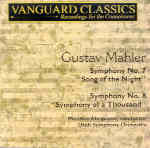Maurice Abravanel’s Mahler Seventh comes very close to Michael Gielen’s, featuring swift tempos and analytical clarity of textures. His straightforward approach pays big dividends in the outer movements, which press forward urgently and inevitably. And if Abravanel misses something of the mystery of the first Nachtmusik, he achieves a decently slithery scherzo, while Nachtmusik II doesn’t linger long enough to become cloying–and you can really hear the mandolin and guitar parts. What Abravanel lacks, of course, is superlative playing (but then Gielen doesn’t have that either, quite). It would be nice if the horns offered greater bravura at the outset of the finale, or if the strings displayed greater sexiness and sheen in the first movement’s moonlit central interlude. Still, the playing actually is quite good (there aren’t any serious mistakes such as, for example, those heard on Sinopoli’s recording with the theoretically “world class” Philharmonia for DG) and the sonics remain well balanced and clear.
Abravanel’s Eighth Symphony also holds up very well. Sure, some of the singers aren’t terribly special, but then the two performances that have the best lineup of soloists (Solti’s and Abbado’s) have other problems, specifically insensitivity to orchestral color (Solti) and terminal dullness (Abbado). Abravanel is never dull. He has huge choral forces at his disposal that sing well, and he’s surprisingly well recorded (the second brass group has excellent presence, the organ is naturally balanced, voices and orchestra enjoy realistic perspectives). In the second movement, he pays particular attention to piquant splashes of color from mandolin, harmonium, and piano, and he brings off the last pages as well as anyone.
As with the Seventh, you can find better played and (marginally) better sung performances, but Mahlerians have enjoyed and respected these very listenable renditions for decades, and with good reason. Along with the Second and Fourth Symphonies, these two performances represent the best of Abravanel’s Mahler, and their musical qualities haven’t dated at all. Reissued at a very reasonable price, they easily earn a place in any serious Mahler symphony collection.
































